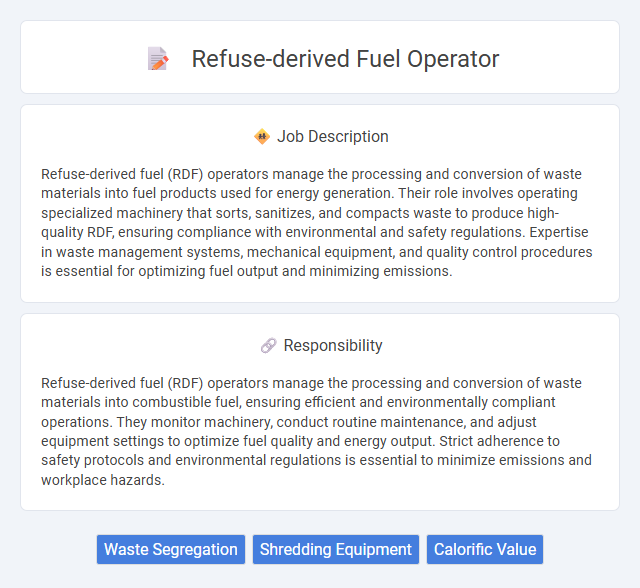
Refuse-derived fuel (RDF) operators manage the processing and conversion of waste materials into fuel products used for energy generation. Their role involves operating specialized machinery that sorts, sanitizes, and compacts waste to produce high-quality RDF, ensuring compliance with environmental and safety regulations. Expertise in waste management systems, mechanical equipment, and quality control procedures is essential for optimizing fuel output and minimizing emissions.
Working as a refuse-derived fuel operator likely suits individuals who can handle physically demanding tasks and maintain focus in potentially hazardous environments. Candidates with good health, stamina, and the ability to follow strict safety protocols are probably better equipped for this role. Those prone to respiratory issues or discomfort around waste materials might find this job less suitable.
Qualification
Refuse-derived fuel (RDF) operators must possess qualifications in waste management, environmental science, or a related technical field, often supported by certifications in hazardous materials handling and safety protocols. Proficiency in operating specialized machinery for processing municipal solid waste into RDF and knowledge of regulatory compliance standards such as OSHA and EPA guidelines are essential. Practical experience in industrial equipment operation and a strong understanding of environmental impact and sustainability practices enhance job performance and career advancement opportunities.
Responsibility
Refuse-derived fuel (RDF) operators manage the processing and conversion of waste materials into combustible fuel, ensuring efficient and environmentally compliant operations. They monitor machinery, conduct routine maintenance, and adjust equipment settings to optimize fuel quality and energy output. Strict adherence to safety protocols and environmental regulations is essential to minimize emissions and workplace hazards.
Benefit
Working as a refuse-derived fuel operator likely provides opportunities for stable employment due to the growing demand for sustainable waste-to-energy solutions. The role probably includes benefits such as competitive wages, health insurance, and potential for skill development in handling advanced machinery. Operators may also experience job satisfaction from contributing to environmental conservation and energy recovery efforts.
Challenge
The Refuse-derived fuel operator role likely involves managing complex machinery to convert waste into usable fuel, which can present technical and operational challenges. There is a strong probability of encountering fluctuating waste quality and safety concerns that require constant monitoring and adjustment. Adapting to evolving environmental regulations may also be a significant aspect of the job's challenge.
Career Advancement
Refuse-derived fuel (RDF) operators play a critical role in converting waste materials into high-quality fuel, essential for sustainable energy production. Career advancement for RDF operators often involves gaining technical certifications, mastering advanced processing equipment, and developing expertise in waste management regulations. Progression can lead to supervisory roles, plant management positions, or specialized consulting opportunities within the renewable energy and waste-to-energy sectors.
Key Terms
Waste Segregation
A refuse-derived fuel (RDF) operator specializes in processing municipal solid waste by segregating recyclable and non-recyclable materials to produce high-quality fuel pellets. Waste segregation involves sorting organic waste, plastics, metals, and inert materials to ensure contaminant-free RDF output, optimizing combustion efficiency and reducing landfill dependency. Proficient knowledge of sorting technologies and environmental regulations is essential for maintaining sustainability and operational safety in RDF facilities.
Shredding Equipment
A refuse-derived fuel (RDF) operator specializes in handling shredding equipment to process municipal solid waste into uniform, combustible fuel products. Proficiency in operating industrial shredders ensures efficient size reduction, which enhances the fuel's calorific value and facilitates downstream handling. Expertise in equipment maintenance and safety protocols minimizes downtime and maximizes production throughput for sustainable energy generation.
Calorific Value
Refuse-derived fuel (RDF) operators play a crucial role in managing waste materials by processing and converting them into high-calorific value fuel used for energy production. They monitor and optimize the calorific value of RDF to ensure efficient combustion and maximize energy output in industrial applications. Accurate measurement and control of calorific value directly impact the economic and environmental performance of waste-to-energy operations.
 kuljobs.com
kuljobs.com